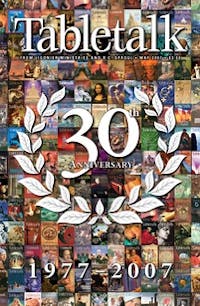
Request your free, three-month trial to Tabletalk magazine. You’ll receive the print issue monthly and gain immediate digital access to decades of archives. This trial is risk-free. No credit card required.
Try Tabletalk NowAlready receive Tabletalk magazine every month?
Verify your email address to gain unlimited access.
Over the years, Tabletalk has been called all sorts of things. At first, it was more homey than glossy, giving the appearance of having been mimeographed in some back room. It was, early on, and appropriately so, in a word, amateurish. As those who worked on the magazine became more polished in their craft, the magazine in turn slowly became more polished, some might even have called it, professional. On a few occasions Tabletalk took strong stands on issues that divided and still divide the Reformed camp, and so Tabletalk has been called doctrinaire, or dogmatic. Tabletalk has always been substantive, such that one friend, and he meant it as a compliment, called Tabletalk “Our Daily Bread on steroids.” Tabletalk has never, as far as I can recall, been called weak, uncommitted, or slick. As far as I can recall, no one has ever suggested that Tabletalk was guilty of pandering, of ear-tickling, of playing it safe. No one has ever suggested that Tabletalk was a magazine looking for a parade to get out in front of. And I pray that such will never be the case.
Wisdom, in the Bible, can be terribly confusing for those of us who are fools. The Proverbs enjoin us, for instance, that we ought not to answer a fool according to his folly, lest we also be like him. Then, in the very next line it tells us that we ought to answer a fool according to his folly, lest he be wise in his own eyes (Prov. 26:4–5). Which is it? This, of course, is the nature of wisdom, as even our uninspired aphorisms seem often double-minded. After all, will we be lost for hesitating, or would it be more prudent to look before we leap? Even Jesus gives us wisdom of this sort, telling us both that we ought to be as wise as serpents, and that we should be as harmless as doves. Wisdom is the ability to know your circumstances, and knowing which nugget ought to be applied in which circumstance.
In our day, for instance, we are awash in Christians zealous to be as wise as serpents. Unfortunately, we are likewise awash in Christians suffering from serpent bites. The evangelical church, over the last fifty or so years, has increasingly come to lean not upon its own understanding, but upon the understanding of the world. They have taken their cues for spreading the evangel from Madison Avenue. They have been consumed by what Neil Postman calls “technopoly,” a culture driven by the application of technology to every human problem. The church-growth movement is the poster child of this tendency. But it is far from the only manifestation.
Evangelical language itself has been reshaped by technology. We have taken it upon ourselves to mold and nuance our message wherever we put it out, lest we offend our audience. Sin is no longer rebellion against the living God. It has been reduced down to at best failures, and at worst, mistakes. God Himself has been given a makeover. That the broader evangelical church seeks to hide the holiness of God not only from those outside the camp, but from those within, is the very reason for the existence of Ligonier Ministries. I once had a conversation with a man, who though he was as innocent as a dove, got his wisdom from a rather “wise” and crafty serpent. “Why can’t we,” he asked me, “sell the holiness of God by pointing out to people the truth that as they understand the holiness of God their lives, their marriages, their relationships would be changed for the better?” I explained, “The moment the holiness of God becomes a means to an end, it ceases to be the holiness of God.”
Jesus is utterly unimpressed with our strategies. He has never sat on His hands, waiting to bless His people and their labors, until we got clever enough. He has, however, refused to bless when we lean on our own understanding. That is why He gave us His strategy. It is stark in its simplicity: Seek ye first the kingdom of God, and His righteousness.
Our hope is that Tabletalk will continue to be a help to the people of God for the next thirty years. For that to happen, Tabletalk will have to be financially viable. We hope that our readership will double, triple, that ten times as many people will be reading Tabletalk in thirty years as read it now. We hope we will have all the tools we need to not just meet the status quo, but to improve the magazine. But these are the “all these things” that will be added, only if we seek first His kingdom and His righteousness. We could make Tabletalk safe. We could grow our audience a hundredfold. We could write gentle platitudes that communicate that God is safe, we are safe. We could publish the equivalent of a monthly lullaby. And all we would lose is the blessing of God. All we would do is have our lampstand removed. All we would do is destroy the very reason for our existence.
We may, over the next thirty years, take the wrong side of an intramural debate in the Reformed world. We may, during that span, be more dogmatic than we ought from time to time. Never let it be said, however, that Tabletalk is safe. For of such is not the kingdom of God.
